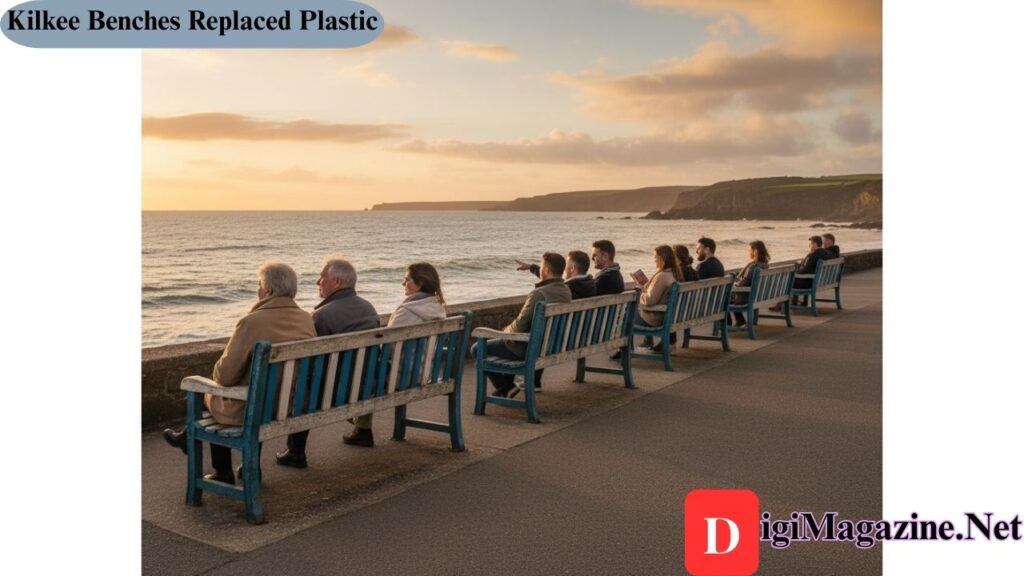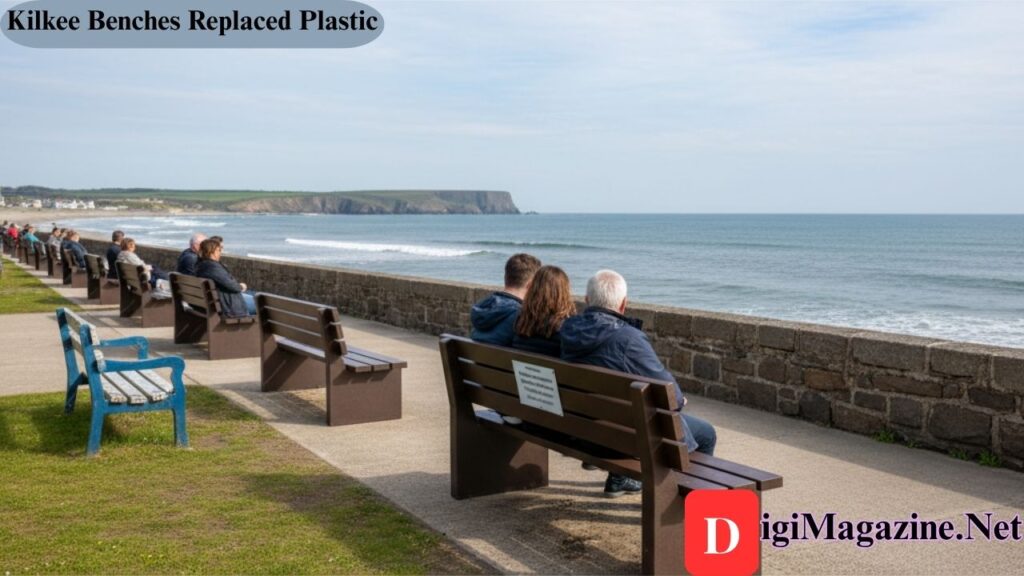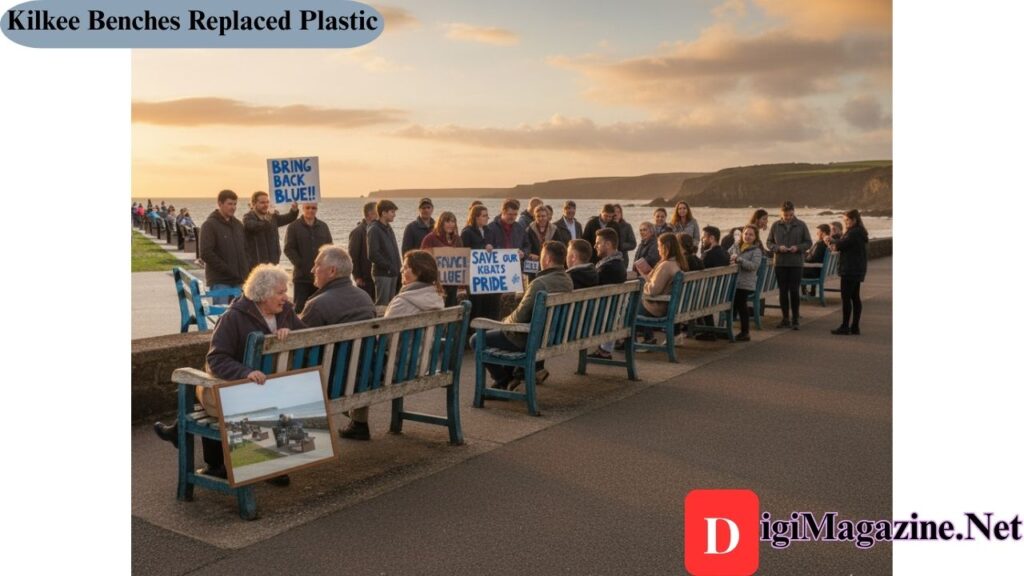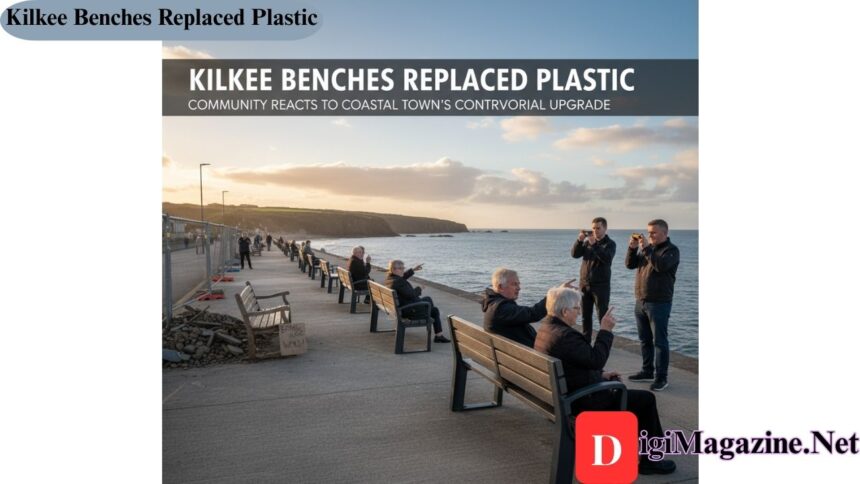Introduction
The picturesque seaside town of Kilkee in County Clare, Ireland, found itself at the center of an unexpected controversy in 2025. The issue? A decision by local authorities to modernize the town’s beloved seafront seating. When Kilkee benches replaced plastic alternatives for the traditional wooden fixtures, residents were quick to voice their opinions about the change that transformed one of the town’s most cherished features.
The replacement project, undertaken by Clare County Council, aimed to introduce more durable and sustainable seating options along the town’s scenic coastline. However, what seemed like a straightforward infrastructure upgrade soon sparked passionate discussions about heritage, aesthetics, and the balance between progress and tradition in this tight-knit coastal community.
The Original Benches

For generations, the wooden benches lining Kilkee’s seafront served as more than just places to rest. These iconic fixtures became part of the town’s identity, offering locals and visitors alike a front-row seat to stunning Atlantic views. The benches were strategically positioned along the promenade and Esplanade, creating perfect vantage points for watching the waves, enjoying summer evenings, or simply taking in the coastal atmosphere.
What made these benches particularly special was their distinctive color scheme. Painted in blue and white stripes, the seating reflected the colors of the local Kilkee GAA club, creating a visual connection between the town’s sporting heritage and its public spaces. This thoughtful detail transformed ordinary street furniture into symbols of local pride and community identity.
The benches had weathered decades of salty sea air, countless tourists, and the changing seasons. They appeared in holiday photographs, served as meeting spots for friends, and provided comfortable perches for elderly residents who enjoyed their daily walks along the seafront. Their presence was so integrated into the fabric of Kilkee life that many residents had never imagined the promenade without them.
The Replacement Initiative

In 2025, Clare County Council made the decision to replace approximately 20 of the original benches with new recycled plastic alternatives. The initiative was part of a broader effort to upgrade public infrastructure with more sustainable and low-maintenance materials. The council selected brown recycled plastic benches as replacements, citing their environmental benefits and durability as key factors in the decision.
The new seating was installed across several key locations throughout the town. The promenade, which runs along the beachfront, received the majority of the new benches. Additional replacements were made along the Esplanade and in various green areas throughout Kilkee. The brown color of the recycled plastic benches marked a significant departure from the traditional blue and white wooden ones that residents had grown accustomed to over the years.
From a practical standpoint, the recycled plastic benches offered several advantages. They required minimal maintenance compared to wooden alternatives, which needed regular painting and treatment to withstand the harsh coastal environment. The plastic material was also resistant to rot, splintering, and weather damage, potentially saving the council money on repairs and replacements in the long term.
The environmental credentials of the new benches were notable as well. Made from recycled materials, they represented a commitment to sustainability and reducing waste. In an era of increasing environmental awareness, the choice aligned with broader trends toward eco-friendly public infrastructure.
Community Response

Despite the practical benefits, the replacement of the traditional benches didn’t sit well with everyone in Kilkee. Residents expressed consternation over the sudden change to their familiar seafront landscape. Many felt a deep emotional attachment to the original benches, viewing them as irreplaceable pieces of the town’s character rather than mere functional objects.
The blue and white color scheme held particular significance for the community. Removing these distinctively painted benches felt, to some residents, like erasing a visible marker of local identity. The GAA colors represented more than just a sports club—they symbolized community pride, shared history, and the unique character that set Kilkee apart from other coastal towns.
Some residents questioned whether adequate consultation had taken place before the decision was made. They wondered if their voices and concerns had been considered in the planning process. The feeling that change had been imposed rather than collaboratively decided upon added to the frustration felt by certain members of the community.
Others raised concerns about aesthetics. While acknowledging the practical benefits of the brown plastic benches, they argued that the new seating lacked the warmth and charm of the wooden originals. The shift from painted wood to uniform brown plastic represented, in their view, a loss of character in exchange for convenience.
However, not all reactions were negative. Some residents appreciated the environmental aspects of the decision and recognized the long-term cost savings for the council. They pointed out that maintaining wooden benches in a harsh coastal environment was both expensive and labor-intensive, and that recycled plastic offered a sensible modern alternative.
The Bigger Picture
The situation in Kilkee reflects a broader challenge facing many traditional communities across Ireland and beyond. Local authorities must balance heritage preservation with practical considerations like maintenance costs, sustainability, and durability. The debate over when Kilkee benches replaced plastic fixtures highlights the complexity of these decisions.
Recycled plastic furniture has become increasingly popular in public spaces worldwide. Parks, coastal paths, and town centers from Dublin to Cornwall have adopted similar seating solutions. The material offers genuine environmental benefits by repurposing waste plastic and reducing the demand for virgin materials. Its longevity means fewer resources spent on replacements over time.
Yet the Kilkee controversy underscores an important truth: not all improvements are universally welcomed, especially when they alter beloved features of a community’s landscape. What officials view as a practical upgrade, residents may experience as an unwelcome disruption to their sense of place and identity.
The challenge for councils lies in finding ways to modernize infrastructure while respecting the emotional and cultural significance that public spaces hold for communities. Consultation, transparency, and perhaps compromise—such as maintaining the iconic color scheme on new materials—could help bridge the gap between practical necessity and community sentiment.
Conclusion
The story of how Kilkee benches replaced plastic alternatives serves as a reminder that even small changes to public spaces can carry significant meaning for communities. What began as a straightforward infrastructure upgrade evolved into a conversation about identity, heritage, and the nature of progress in traditional Irish towns.
As Kilkee moves forward, the brown recycled plastic benches will likely become familiar fixtures in their own right. Perhaps future generations will develop the same affection for them that current residents hold for the blue and white wooden benches of years past. Or perhaps the council will find creative solutions that honor tradition while embracing modern materials.
What remains clear is that the people of Kilkee care deeply about their town and its character. Whether supporting or opposing the change, residents have demonstrated that public spaces matter, that community identity is worth protecting, and that discussions about even the smallest details of civic life deserve attention and respect.
For more information, visit Digi Magazine.





